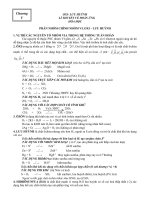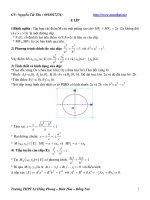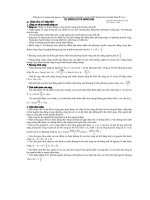lý thuyết và bài tập về ARTICLES Mạo từ A, An, The
Bạn đang xem bản rút gọn của tài liệu. Xem và tải ngay bản đầy đủ của tài liệu tại đây (83.57 KB, 7 trang )
ARTICLES – MẠO TỪ A, AN, THE
I. Mạo từ là gì?
Mạo từ là từ đứng trước danh từ nhằm cho biết danh từ đó nói đến một đối tượng xác định hay không xác định.
Mạo từ không phải một loại từ riêng biệt, chúng có thể được xem là một bộ phận của tính từ dùng bổ nghĩa cho
danh từ.
II. Phân loại mạo từ trong tiếng Anh
Trong tiếng Anh, mạo từ được chia làm 2 loại:
Mạo từ không xác định: A, An
Mạo từ xác định: The
Mạo từ Zero (Zero article) hay danh từ không có mạo từ đứng trước: thường áp dụng cho danh từ không đếm
được (uncountable nouns) và danh từ đếm được ở dạng số nhiều: rice, tea, people, clothes...
III. Cách sử dụng mạo từ
1. Mạo từ 'The'
Mạo từ the được sử dụng kèm với cả danh từ số ít và danh từ số nhiều. Chúng ta có thể dùng “the apple” hay
“the apples” đều được. Tuy nhiên, mạo từ the có đặc điểm là phải dùng với danh từ xác định, được nói đến từ
lần thứ 2 trở đi.
Ví dụ: I live in a house. The house is large. (Tôi sống ở một ngôi nhà. Ngôi nhà ấy rộng lắm.)
Trong ví dụ trên, từ house đầu tiên phải đi với mạo từ 'a' vì chúng ta không biết ngôi nhà được nói đến là ngôi
nhà nào. Tuy nhiên khi được nhắc lại ở câu số 2 thì chúng ta đã xác định được ngôi nhà nói tới, do vậy
từ house sau đó đi với mạo từ 'the'.
Các trường hợp sử dụng mạo từ 'The'
Ngữ cảnh cụ thể
Ví dụ minh hoạ
Khi vật thể hay nhóm vật thể là duy nhất hoặc được xem là duy nhất
The sun, the world, the earth
I see a dog. The dog is chasing a
mouse
The dotor that I met yesterday is
my sister
Trước một danh từ nếu danh từ này vừa được để cập trước đó
Trước một danh từ nếu danh từ này được xác bằng 1 cụm từ hoặc 1
mệnh đề
Đặt trước một danh từ chỉ một đồ vật riêng biệt mà người nói và người
nghe đều hiểu
Trước so sánh nhất (đứng trước first, second, only..) khi các từ này được
dùng như tính từ hoặc đại từ.
The + danh từ số ít: tượng trưng cho một nhóm thú vật hoặc đồ vật
Đặt “the” trước một tính từ để chỉ một nhóm người nhất định
The được dùng trước những danh từ riêng chỉ biển, sông, quần đảo, dãy
núi, tên gọi số nhiều của các nước, sa mạc, miền
The + of + danh từ
The + họ (ở dạng số nhiều) có nghĩa là Gia đình
Dùng “the” nếu ta nhắc đến một địa điểm nào đó nhưng không được sử
Please pass the jar of snack
He is the tallest person in the
world.
The fast-food is more and more
prevelent around the world
The old, the poor, the rich.
The Pacific, The United States , the
Alps
The North of Vietnam, The West of
Germany
The Smiths
They went to the school to see their
dụng với đúng chức năng.
children.
2. Mạo từ A
Cách sử dụng mạo từ 'A'
Mạo từ A trước các từ bắt đầu bằng một phụ âm hoặc một nguyên âm có âm là phụ âm. Ngoài ra chúng bao
gồm một số trường hợp bắt đầu bằng u, y, h.
Các trường hợp sử dụng mạo từ 'A'
Ngữ cảnh cụ thể
Ví dụ minh hoạ
Đứng trước một danh từ mở đầu bằng “uni” và "eu" phải dùng a
a university, a uniform, a
eulogy
Dùng trước “half” (một nửa) khi nó theo sau một đơn vị nguyên vẹn: a kilo and a
half, hay khi nó đi ghép với một danh từ khác để chỉ nửa phần (khi viết có dấu
gạch nối): a half – share, a half – day
My mother bought a
half kilo of oranges.
Dùng với các đơn vị phân số như 1/3 a/one third – 1/5 a /one fifth
Dùng trong các thành ngữ chỉ giá cả, tốc độ, tỉ lệ: $4 a kilo, 100 kilometers an
hour, 2 times a day.
Dùng trong các thành ngữ chỉ số lượng nhất định như: a lot of/ a couple/ a dozen.
Dùng trước những số đếm nhất định thường là hàng ngàn, hàng trăm như a/one
hundred – a/one thousand.
I get up at a quarter past
six.
John goes to work three
times a week.
I want to buy a
dozen eggs.
My school has a
hundred students.
3. Mạo từ "An"
Cách sử dụng mạo từ 'An'
Mạo từ an được dùng trước những từ bắt đầu bằng nguyên âm (dựa theo cách phát âm, chứ không dựa vào cách
viết).
Các trường hợp sử dụng mạo từ 'A'
Ngữ cảnh cụ thể
Ví dụ minh hoạ
Mạo từ đi kèm với những từ có bắt đầu là a, e, i,
o
Mạo từ đi kèm với những từ có bắt đầu là "u"
Một số từ bắt đầu bằng âm "h" câm
an apble, an aircraft, an egg, an
object
an uncle, an umbrella
an heir, half an hour
IV. Những lưu ý khi sử dụng mạo từ trong tiếng Anh
Không sử dụng mạo từ xác định 'The' trong các trường hợp sau:
Trường hợp cụ thể
Ví dụ minh hoạ
Trước tên quốc gia, tên châu lục, tên núi, tên
hồ, tên đường.
Europe, Viet Nam, Ho Xuan Huong Street
Khi danh từ không đếm được hoặc danh từ số
nhiều dùng theo nghĩa chung nhất, chứ không
chỉ riêng trường hợp nào.
Sau sở hữu tính từ (possessive adjective) hoặc
sau danh từ ở sở hữu cách (possessive case).
Trước tên gọi các bữa ăn.
Trước các tước hiệu.
Trong một số trường hợp cụ thể sau.
- I don’t like noodles
- I don’t like Sundays
The girl’s mother = the mother of the girl
I invited Marry to dinner.
President Nguyen Tan Dung
- Men are always fond of soccer.
- In spring/in autumn (Vào mùa xuân/mùa thu), last night
(đêm qua), next year (năm tới), from beginning to end (từ
đầu tới cuối), from left to right (từ trái sang phải)
Không sử dụng mạo từ không xác định 'A/An' trong các trường hợp sau:
Trường hợp cụ thể
Ví dụ minh hoạ
Trước tên quốc gia, tên châu lục, tên núi, tên
hồ, tên đường.
Khi danh từ không đếm được hoặc danh từ số
nhiều dùng theo nghĩa chung nhất, chứ không
chỉ riêng trường hợp nào.
Sau sở hữu tính từ (possessive adjective) hoặc
sau danh từ ở sở hữu cách (possessive case).
Trước tên gọi các bữa ăn.
Trước các tước hiệu.
Trong một số trường hợp cụ thể sau.
Europe, Viet Nam, Ho Xuan Huong Street
- I don’t like noodles
- I don’t like Sundays
The girl’s mother = the mother of the girl
I invited Marry to dinner.
President Nguyen Tan Dung
- Men are always fond of soccer.
- In spring/in autumn (Vào mùa xuân/mùa thu), last night
(đêm qua), next year (năm tới), from beginning to end (từ
đầu tới cuối), from left to right (từ trái sang phải)
EXCERCISES
Bài tập 1: Điền a/an hoặc the
1. This morning I bought….newspaper and …….magazine. …….newspaper is in my bag but I don’t know
where I put…..magazine.
2. I saw ……accident this morning. ……car crashed into …..tree. ………driver of ……car wasn’t hurt but
…..car was badly damaged.
3. There are two cars parked outside:……..blue one and …….grey one. ……..blue one belongs to my
neighbors. I don’t know who ….. owner of…..grey one is.
4. My friends live in…….old house in……small village. There is …….beautiful garden behind ……..house. I
would like to have……garden like this.
5. This house is very nice. Has it got …….garden?
6. It’s a beautiful day. Let’s sit in……..garden.
7. Can you recommend ……..good restaurant?
8. We had dinner in…….most expensive restaurant in town.
9. There isn’t ……….airport near where I live. …….nearest airport is 70 miles away.
10. “Are you going away next week?”
- “No, …..week after next”
Bài tập 2: Hoàn thành các câu dưới đây sử dụng một giới từ phù hợp
Bed, home, hospital, prison, school, university, work
1. Two people were injured in the accident and were taken to hospital.
2. In Britain, children from the age of five have to go………………
3. Mark didn’t go out last night. He stayed……………………..
4. I’ll have to hurry. I don’t want to be late……………..
5. There is a lot of traffic in the morning when everybody is going………………
6. Cathy’s mother has just had an operation. She is still……………
7. When Julia leaves school, she wants to study economics…………….
8. Bill never gets up before 9 o’clock. It’s 8.30 now, so he is still……………..
9. If you commit a serious crime, you could be sent……………….
Bài tập 3: Chọn đáp án đúng
1. I’m afraid of dogs/the dogs.
2. Can you pass the salt/salt, please?
3. Apples/the apples are good for you.
4. Look at apples/the apples on that tree! They are very big.
5. Women/the women live longer than men/the men.
6. I don’t drink tea/the tea. I don’t like it.
7. We had a very nice meal. Vegetables/ the vegetables were especially good.
8. Life/the life is strange sometimes. Some very strange things happen.
9. I like skiing/the skiing. But I’m not good at it.
10. Who are people/the people in this photograph?
11. What makes people/the people violent? What causes aggression/the aggression?
12. All books/all the books on the top shelf belong to me.
13. First world war/ the first world war lasted from 1914 until 1918.
14. One of our biggest problems is unemployment/the unemployment.
Bài 4: Chọn đáp án đúng để điền vào chỗ trống (chú ý: ký hiệu “x” có nghĩa là không cần mạo từ)
1. We are looking for _______ place to spend ________ night.
A. the/the
B. a/the
C. a/a
D. the/a
2. Please turn off ________ lights when you leave ________ room.
A. the/the
B. a/a
C. the/a
D. a/the
3. We are looking for people with ________experience.
A. the
B. a
C. an
D. x
4. Would you pass me ________ salt, please?
A. a
B. the
C. an
D. x
5. Can you show me ________way to ________station?
A. the/the
B. a/a
C. the/a
D. a/the
C. the
D. x
6. She has read ________interesting book.
A. a
B. an
7. You’ll get ________shock if you touch ________ live wire with that screwdriver.
A. an/the
B. x/the
C. a/a
D. an/the
8. Mr. Smith is ________ old customer and ________ honest man.
A. An/the
B. the/an
C. an/an
D. the/the
9. ________ youngest boy has just started going to ________ school.
A. a/x
B. x/the
C. an/x
D. the/x
10. Do you go to ________ prison to visit him?
A. the
B. a
C. x
11. ________eldest boy is at ________ college.
A. a/the
B. the/x
C. x/ a
D. an
D. an/x
12. Are you going away next week? No, ________ week after next.
A. an
B. a
C. the
D. x
13. Would you like to hear ________ story about ________ English scientist?
A. an/the
B. the/the
C. a/the
D. a/ an
14. There’ll always be a conflict between ________ old and ________ young.
A. the/the
B. an/a
C. an/the
D. the/a
15. There was ________ collision at ________ corner.
A. the/a
B. an/the
C. a/the
D. the/the
16. My mother thinks that this is ________ expensive shop.
A. the
B. an
C. a
D. x
17. Like many women, she loves ________ parties and ________gifts.
A. the/ a
B. a/the
C. a/a
18. She works seven days ________ week.
A. a
B. the
C. an
D. x/x
D. x
19. My mother goes to work in ________ morning.
A. a
B. x
C. the
D. an
20. I am on night duty. When you go to ________ bed, I go to ________ work.
A. a/x
B. a/the
C. the/x
D. x/x
Bài 5: Câu chuyện sau được chia thành các câu nhỏ, hãy đọc và điền mạo từ thích hợp “a/an/ the hoặc x
(không cần mạo từ)” vào chỗ trống:
1. There was ________knock on ________door. I opened it and found ________small dark man in
________blue overcoat and _______woolen cap.
2. He said he was ________employee of ________gas company and had come to read ________meter.
3. But I had ________suspicion that he wasn't speaking ________truth because ________meter readers usually
wear ________peaked caps.
4. However, I took him to ________ meter, which is in ________dark corner under ________ stairs.
5. I asked if he had ________ torch; he said he disliked torches and always read ________ meters by
________light of ________match.
6. I remarked that if there was ________leak in ________ gas pipe there might be ________ explosion while he
was reading ________meter.
7. He said, “As ________matter of ________fact, there was ________explosion in ________last house I
visited; and Mr. Smith, ________owner of ________house, was burnt in ________face.”
8. “Mr. Smith was holding ________lighted match at ________time of ________explosion.”
9. To prevent ________possible repetition of this accident, I lent him ________torch.
10. He switched on ________torch, read ________meter and wrote ________ reading down on ________back
of ________envelope.
11. I said in ________surprise that ________meter readers usually put ________readings down in
________book.
12. He said that he had had ________book but that it had been burnt in ________fire in________ Mr. Smith's
house.
13. By this time I had come to ________conclusion that he wasn't ________genuine meter reader; and
________moment he left ________house I rang ________police.
Bài 6: Điền mạo từ thích hợp “a/an/the hoặc x (không cần mạo từ)”” vào chỗ trống.
14. Are John and Mary ________cousins? ~
No, they aren't ________cousins; they are ________brother and ________sister.
15. ________fog was so thick that we couldn't see ________ side of ________road. We followed ________car
in front of us and hoped that we were going ________right way.
16. I can't remember ________exact date of ________storm, but I know it was on ________Sunday because
everybody was at ________church. On ________Monday ________post didn't come because ________roads
were blocked by ________fallen
trees.
17. Peter thinks that this is quite ________ cheap restaurant.
18.
A: There's ________murder here. ~
B: Where's ________body?~
A: There isn't ________body. ~
B: Then how do you know there's been ________murder?
19. Number ________hundred and two, - ________house next door to us, is for sale.
It's quite ________nice house with ________big rooms ________back windows look out on ________park.
20. I don't know what ________price ________owners are asking. But Dry and Rot are ________agents. You
could give them ________ring and make them ________offer.
21. ________postman's little boy says that he'd rather be ________dentist than ________doctor, because
________dentists don't get called out at ________night.
22. Just as ________air hostess (there was only one on the plane) was handing me ________cup of
________coffee ________plane gave ________lurch and ________ coffee went all over ________person on
________other side of ________gangway.
23. There was ________collision between ________car and ________cyclist at ________ crossroads near
________my house early in ________morning.
24. Professor Jones, ________man who discovered ________new drug that everyone is talking about, refused
to give ________press conference.
25 Peter Piper, ________student in ________ professor's college, asked him why he refused to talk to
________press.









